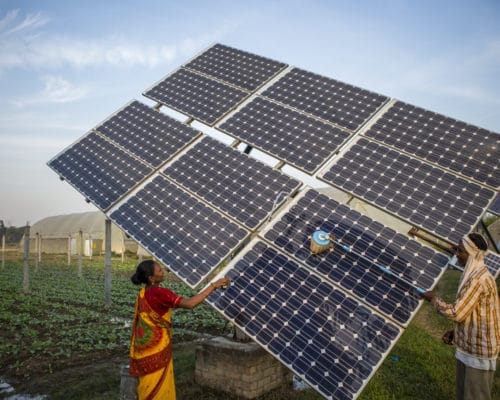Region

How Gender and Energy Access Connect Together
It is forecasted that by 2030 the number of people without electricity could increase by 35 million to 660 million compared to earlier estimations. This threatens to slow down efforts towards gender equality. In this context, progress in the clean energy sector helps reduce poverty and fosters female empowerment.

IPCC Report: Climate Finance for Adaptation Must Increase for Developing Countries
The latest IPCC Working Group II report largely stresses the need to accelerate climate adaptation, eradicate injustice and end the use of fossil fuels. The report, ‘Climate Change 2022: Impacts, Adaptation, and Vulnerability,’ emphasised that coal and other fossil fuels are choking humanity.

The LNG Outlook of the Philippines and Its Impact on the Country’s Future
In a world where gas is becoming the "new coal" in the eyes of financial institutions, governments and the public, the Philippines has to withstand the pressure to lock itself into a fossil fuel-powered future.

The Japan Transition Bonds Programme and the Transition Washing Concerns
In the era of ESG-conscious investors, green and transition washing moves are quickly found out. The case of JERA and Tokyo Gas transition bonds programs risk eroding the trust of the financial industry in Japan and its clean energy transition commitments.
The China Belt and Road Initiative Investment Report 2021 and its Message to the World
The latest Belt and Road Initiative Investment Report is a testament that China will be looking to further strengthen its case as the global clean energy leader through extensive green financing and diminishing support for coal.
China’s Hydrogen Strategy for Olympics 2022: Pushing Green Hydrogen Transport
The Beijing Olympics are being powered by 100% renewable energy. A significant part of this is public transportation vehicles that run on green hydrogen. What does this mean for the future of hydrogen energy in Asia?
The Global Energy Transition: How the World Sees It
The global energy transition is a reality. Public pressure, falling renewable energy costs, and improving technology are driving the change. The coming decade will be a pivotal point in this transition and will likely dictate whether we meet the international climate goals.
Energy Transition in Asia: Balancing Two Sides
Asia's energy transition has been largely lackluster. Several of the world's largest polluters are found in the region and emissions rates have been steadily climbing. But with China leading the clean energy transition in Asia, will the region be able to spur forward?
What Is The Current Energy Transition Strategy?
Successfully switching to renewable energy requires a well thought out strategy. There are multiple stages in the transition, and each must be considered.
Where Does India Stand in the Energy Transition?
India has one of the largest installed renewable energy capacities globally, but the country's current share of renewable energy does not cover its "fair share" of decarbonisation efforts. However, with its GDP steadily growing, it is perfect timing for India to capitalise on renewables.
Energy Transition in Singapore: A Renewable Energy Leader in Asia
The WEF's 2021 Energy Transition Index puts Singapore as the highest rated country in Asia. Despite the country's lack of resources, they have developed a unique strategy focusing on clean energy. Here's a look at how Singapore does it.
Global Energy Transition Index – Quantifying Progress
The Energy Transition Index is a score of how well a country is doing in their energy transition. Ultimately, this tool can be used to identify areas that need funding, support, or incentives to speed up change.
Energy Transition Fund – Capitalising on Renewable Energy
The global change to renewable energy has largely been financed by governments and public institutions but the energy transition cannot be fully funded by governments. There is significant room for the private sector to become more involved.
Most Popular
Categories
-
9
-
31
-
127
-
4
-
17
-
39
-
50
-
14
-
10
-
15
-
23
-
6
-
153
-
161
-
23
-
1
-
22
-
29
-
36
-
64
-
14
-
74
-
40
-
17
-
6
-
28
-
20
-
84
-
243
-
20
-
35
-
31
-
9
-
41
-
35

